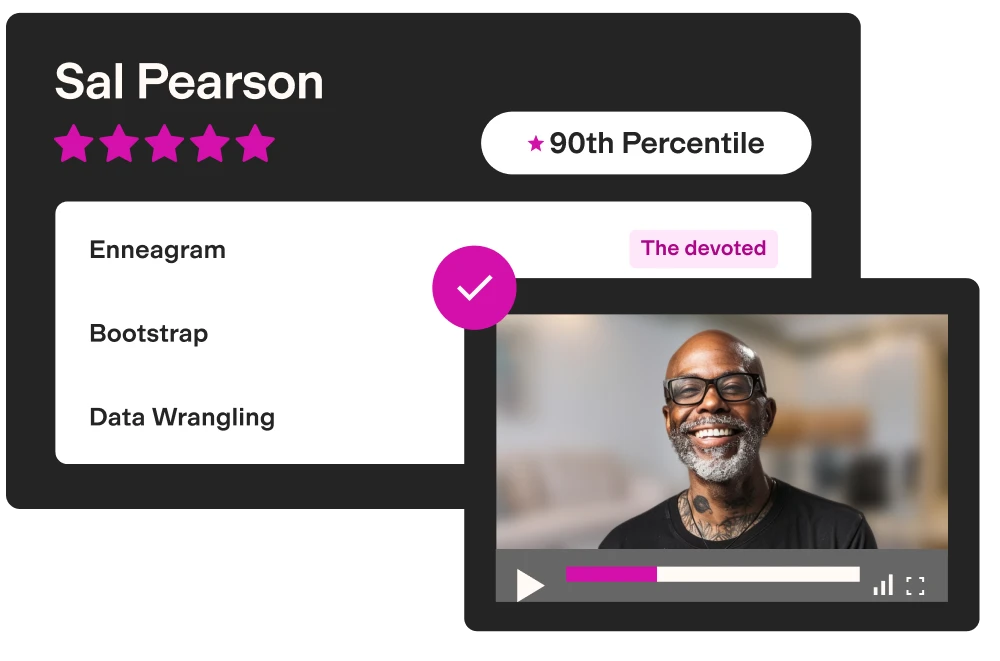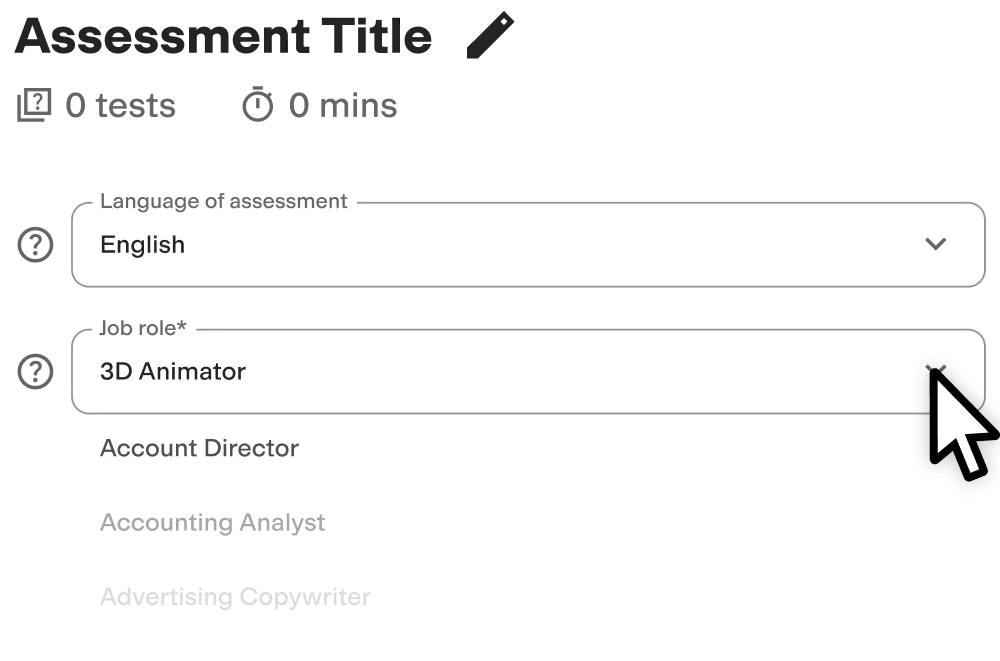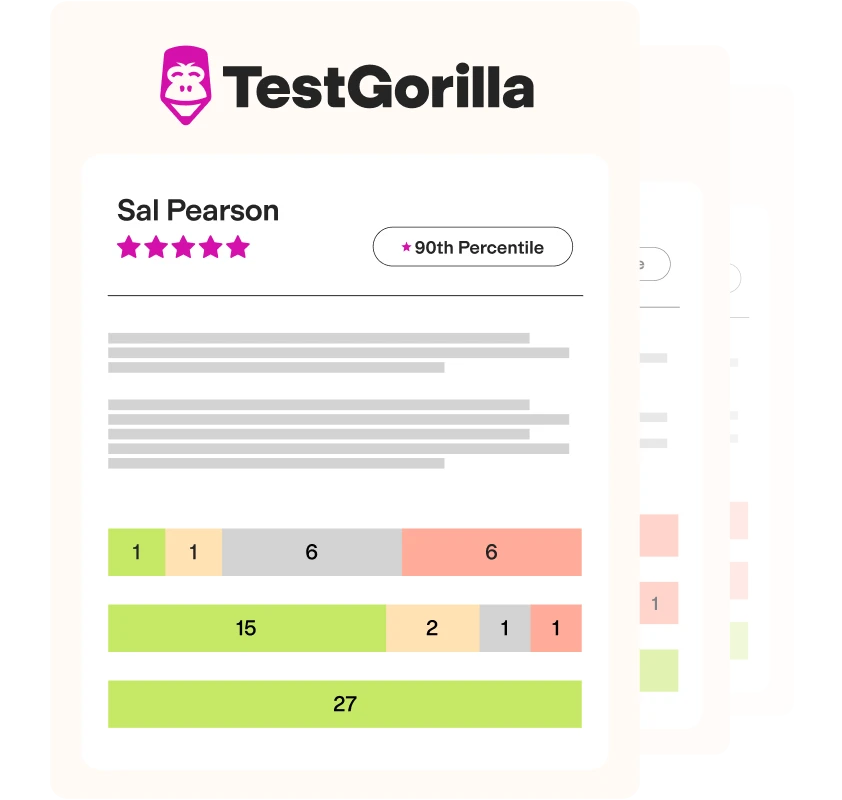DISC Personality test
Summary of the DISC test
The DISC test assesses a person’s behavioral style and personality traits to determine their motivation and reactions in group settings, including how they behave at work. This test classifies how candidates express emotions. The acronym refers to four behavior types:
Dominance (D)
Influence (I)
Steadiness (S)
Conscientiousness (C)
Use the DISC test to hire
Any job role. This test helps you better understand your candidates and current team members and build effective ways to collaborate and communicate.
About the DISC personality test
The DISC personality assessment gauges behaviors and motivations by measuring a candidate on four different personality types: Dominance (D), Influence (I), Steadiness (S), and Conscientiousness (C).
Candidates can belong to one of the four main behavioral types or exhibit a combination between one type and one of its two adjacent ones, giving a total of 12 possible outcomes.
Understanding what motivates you and others to take action and make decisions helps you navigate relationships, collaborations, and conversations. Once you understand the main trait that governs your and others’ behavior, you can tailor your words and actions and guide your employees to achieve better results.
The DISC personality profile discovers these traits by asking candidates to evaluate themselves with self-awareness. Applicants review 48 statements and rate them from 1 (very inaccurate) to 5 (very accurate). Here are a few examples:
I joke around a lot.
I hesitate to criticize other people’s ideas
I am emotionally reserved
For a quick DISC personality types test, check out our sample questions.
The assessment results page describes the candidate’s type, provides insights into their work style and how they may behave at work, and shows their in-depth traits and main challenges. Using the DISC test for hiring and employee development lets you understand your people, helps team building, and encourages teamwork and effective collaboration.
The test is made by a subject-matter expert
TestGorilla’s tests are created by subject matter experts. We assess potential subject-matter experts based on their knowledge, ability, and reputation.Before being published, each test is peer-reviewed by another expert, then calibrated using hundreds of test takers with relevant experience in the subject.
Our feedback mechanisms and unique algorithms allow our subject-matter experts to constantly improve their tests.
Margarida R.
Margarida is a clinical psychologist and psychometrist. Her work has focused on studying and conducting psychological evaluations on different populations across a variety of clinical settings, from pain clinics and hospitals in Chicago to state prisons in Los Angeles.
Two years ago, Margarida opened her own private practice in her hometown of Lisbon, Portugal, where she now dedicates her time to developing new psychological tests, conducting research, and doing therapy in person and online.
Use TestGorilla to hire the best faster, easier and bias-free
Our screening tests identify the best candidates and make your hiring decisions faster, easier, and bias-free.
Create high-quality assessments, fast
Building assessments is a breeze with TestGorilla. Get started with these simple steps.
What is the DISC Personality test?
Our DISC job test helps you understand candidates’ behavior and how they are likely to interact and use interpersonal communication with others while on the job. It’s based on the DISC theory, which was developed by psychologist William Moulton Marston.
This behavioral assessment classifies how people express emotions into four behavior types/quadrants: Dominance (D), Influence (I), Steadiness (S), and Conscientiousness (C).
Candidates’ personality types are represented by either a single one of the four behavior traits or by two of these traits.
In a DISC report, the four main DISC test personality traits include:
D: These people prefer independence and autonomy and are determined and resourceful. They may be more impatient and react negatively when others try to limit their authority.
I: This type of person is easy to approach and enjoys spending time with others. They find it difficult to plan and struggle with spending time away from people.
S: S types listen patiently to others, and their support is helpful in stressful situations. This type finds it challenging to deliver negative information and speak directly.
C: These people are objective and logical in their approach, using excellent problem-solving. It can be challenging for them to overcome their perfectionism and their need to double-check everything before making a decision.
Candidates may also fall under two DISC model types at once:
Type | Primary traits |
DC | Independent, focused on results, finds flexibility challenging |
DI | Assertive, decisive, struggles with controlling too many situations |
ID | Energetic, adventurous, finds routine difficult |
IS | Trustworthy, accommodating, may avoid challenges and actively seek conflict resolution |
SI | Caring, considerate, struggles to detach themselves from situations |
SC | Perceptive, detail-oriented, puts off risky decisions, seeks validation |
CD | Prefers autonomy, prizes efficiency, can be overly critical of others |
CS | Rational, logical, can be overly cautious |
Why is DISC personality important to employers?
The DISC work personality test gives you a deeper understanding of each applicant and how their DISC personality style would complement the team. Learning candidates’ behaviors helps you align them to your company culture and your specific open role.
For example, a supportive S type would make an excellent addition to a company culture focused on continuous learning. However, an assertive DI type would be perfect in a customer-facing sales role.
Employers must consider a skills and personality assessment to find the perfect hire. The right behaviors increase engagement and build stronger teams. Even one toxic employee who doesn’t add to your culture can damage motivation.
Solid Solutions Management, an engineering software firm, uses TestGorilla’s DISC test in its hiring process. Adam Hartles, the Technical Services Manager, particularly loves that the DISC style test has no “right or wrong answer” – it just helps you understand each candidate.
The DISC evaluation test enables you to make an informed decision and create a healthy work environment. Other personality model tests, like the Big 5 (OCEAN) test, also help you better understand your applicants by measuring openness and emotional stability.
What job roles can you hire with our DISC Personality test?
DISC assessment personality tests give valuable insights for any open role. These questions help you discover how candidates communicate, collaborate with others, and approach conflict. It also helps you find critical leadership qualities.
Here’s how the DISC personality test helps you hire the best in various job roles:
Sales professionals: Salespeople must be confident, bold, and charismatic to properly build rapport with customers and create value
HR managers: HR professionals need to be patient and supportive to help employees grow and mediate conflicts
Data scientists: Data scientists benefit from prizing autonomy, structure, and control – this helps them focus on logical outcomes and enables them to work independently
Project managers: Project managers should focus on results but also be ready and willing to connect with people to manage internal and external stakeholders
Trainers: Trainers should be assertive but still understanding and patient, enabling them to boldly instruct trainees but empathetically understand issues
Chief executive officer: The DISC test discovers leaders who are decisive and authoritative and can map out strategies with confidence but also adapt to changes
Create a multi-measure assessment: 4 tests to pair with the DISC Personality test
The DISC personality test can be paired with many tests to create a powerful multi-measure assessment tool.
You shouldn’t use a DISC profile test alone, but when combined with other tests, like role-specific and cognitive tests, it measures adaptive behavioral traits in any candidate and provides a holistic view of the applicant.
Here are a few suggestions for building a multi-measure assessment using our DISC assessment test:
Problem Solving test : Measure a job seeker’s ability to analyze information and use critical thinking to make sound decisions. Combined with the DISC test, the Problem Solving test helps you find applicants who can handle complex situations.
Communication test: Gauge how an applicant communicates, including their written and verbal communication style. Pairing this with the DISC test lets you learn how well a candidate communicates and how they prefer to communicate.
Culture Add test: Evaluate a candidate’s values and how they align with your company culture. Using this with the DISC test helps you find an employee who suits your organizational culture and strengthens your team.
Leadership & People Management test: Assess key leadership qualities, including how an applicant influences and guides others. Combining this test with the DISC test helps you find leaders who can effectively support and develop others.
Note: We haven’t included any role-specific skills tests here because they depend on the position you’re hiring for. However, we highly recommend you add at least one in your five-test assessment to ensure your candidates possess the right skills for the job.
FAQs
View a sample report
The DISC test will be included in a PDF report along with the other tests from your assessment. You can easily download and share this report with colleagues and candidates.







